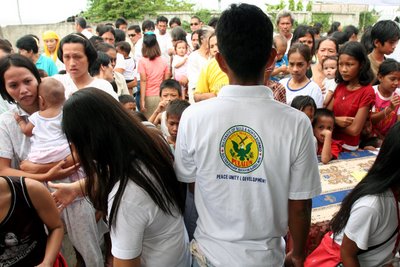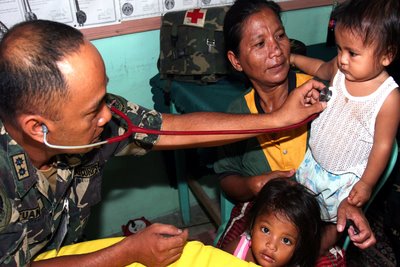Photo: Sunrise In Jolo Island
 Sunrise in Jolo.
Sunrise in Jolo.
 Sunrise in Jolo.
Sunrise in Jolo.

ZAMBOANGA CITY (AKI / 25 Aug) The restoration of the ancient Islamic Sultanate of Sulu and North Borneo would be the best solution to unrest in the southern Philippines unrest, a local historian told AdnKronos International (AKI).
Professor Emmanuel Mangubat, a member of the Sulu Restoration Movement, argued that a return to monarchial and Islamic tradition is exactly what the conflict-ridden region needs.(Read more)
Prof. Sami Tanjil said a former transportation secretary Pantaleon Alvarez, organizer of One People Mindanao, a movement lobbying for a separate Mindanao Republic, was in Zamboanga City early this year and tried, but failed to convince the sultan and his cabinet members to support the proposal.
"Alvarez tried, but failed to convince the sultan to throw his support to the proposal. Sultan Pulalun walked out from the meeting after Alvarez sought his support for the so-called Mindanao Republic."
"The sultan was angry and said that he shall not allow Mindanao to be dismembered and for the Muslims not to be used for political agenda,” Tanjil said.
Pulalun has confirmed the meeting and said he was unaware of Alvarez’s real motives. He said the meeting was attended by cabinet members of the Royal Sultanate of Sulu and North Borneo and advisers.
“I was shocked to learn that he was here to convince us to support this so-called Mindanao Republic, and I walked away. We don’t want any part of this political agenda.”
“We will not allow ourselves be used for whatever purpose other than promoting peace and unity in the southern Philippines,” Pulalun, a staunch supporter of President Arroyo, said.
Pulalun said the Muslims are supporting the government and President Arroyo’s peace and economic agenda in the southern region. “I have told my people to continue to stay united and not to allow themselves be used by any political groups,” the sultan said.
Alvarez previously said that only a separate Mindanao Republic can help solve the problems the island is facing. He said a Charter change, as proposed by lawmakers, would not resolve the current political problems and crisis the country is experiencing.
But many Mindanao leaders are also supporting proposals to convene a Constitutional Assembly in order to allow amendments in the Charter that would institutionalize wide-ranging reforms. The proposal would also limit the agenda of amendments and protect the good provisions of the Charter.
The OPM had been advocating for a separate Mindanao and urged citizens to demand the separation of the region from Manila's administrative control.


 Princess Pulalun, top photo, assists in the medical mission of the Sultanate of Sulu and North Borneo in Zamboanga City
Princess Pulalun, top photo, assists in the medical mission of the Sultanate of Sulu and North Borneo in Zamboanga City
|




 Sultan Sharif Ibrahim Ajibul Mohammad Pulalun, top, leads a huge pro-US rally in Jolo island as the mayor Alkramer Izquierdo looks on.
Sultan Sharif Ibrahim Ajibul Mohammad Pulalun, top, leads a huge pro-US rally in Jolo island as the mayor Alkramer Izquierdo looks on.
Hundreds of placard-bearing villagers, some came as far as the Parang town, south of the island, to join the rally led by the influential Sultan of Sulu and North Borneo, Sharif Ibrahim Ajibul Mohammad Pulalun.
It was the first time the secluded Pulalun came out in the open to publicly support the Balikatan (shoulder-to-shourlder) 2006, the codename for the RP-US military drills
“I call on every Muslims in Sulu to support the government and the Balikatan program because this will bring us more humanitarian aid. Let us show the world that we are peaceful citizens. I appeal to every Muslims to welcome our American visitors and support their peaceful cause,” the 50-year old leader, who is a staunch supporter of President Gloria Arroyo, said.
Pulalun appealed to Washington to send more humanitarian aid to poor Muslims in Jolo.
Dozens of Muslim activists previously demanded that US troops leave Jolo. They had burned mock US flags and displayed anti-US placards, including one that read “Bud Daho, never again,” referring to a Jolo area where American forces bloodily crushed a Muslim uprising about a century ago.
The training in Jolo brought humanitarian and medical aid to many poor families on the island, one of the poorest provinces under the Muslim autonomous region.The US Navy medical ship, Mercy, also held a medical mission in Jolo just several months ago.
But Jolo is also a known stronghold of the kidnap-for-ransom Abu Sayyaf group, blamed for the spate of kidnappings and terrorism in the troubled southern region, and any attack on US soldiers could jeopardize government efforts to bring aid and development to the island.
A small number of US troops are still in Jolo, providing training to Filipino soldiers and humanitarian missions.
This year’s joint training was the 22nd in a series of drills that began in 1981, and would involve about 250 US troops and 4,000 Filipino infantry and marine troops, said Brig. Gen. Nehemias Pajarito, then commander of the Philippine Army in Jolo.
Security was tight during the exercises to protect the US and Filippino soldiers against possible attacks by Abu Sayyaf militants.
The Abu Sayyaf previously threatened to attack US targets in the Philippines, and had killed three Americans, including a soldier, in Zamboanga City in 2002.(Arab News)


 Sharif Ibrahim Ajibul Mohammad Pulalun, the Sultan of Sulu and North Borneo
Sharif Ibrahim Ajibul Mohammad Pulalun, the Sultan of Sulu and North Borneo
The Sultanate of Sulu was a Muslim state that ruled over much of the islands of the Sulu Sea, in the southern Philippines. The sultanate was founded in the 1457 (other sources claim earlier) and is believed by Muslim historians to have existed for a few centuries although most sources mention that the sultanate was conquered by the Spanish in the 17th century.
The Philippines was later annexed by the United States, in 1898, as a result of the Spanish-American War. Only North Borneo went to the British, and later became part of Malaysia as Sabah in 1963.
At its peak, it stretched over the islands that bordered the western peninsula of Mindanao in the east, to North Borneo, currently known as Sabah, in the west and south, and to Palawan in the north. Today significant number of Tausug have been living in Sabah. During the MNLF and Philippines war in the early 1970s, the number increased...(Read more)